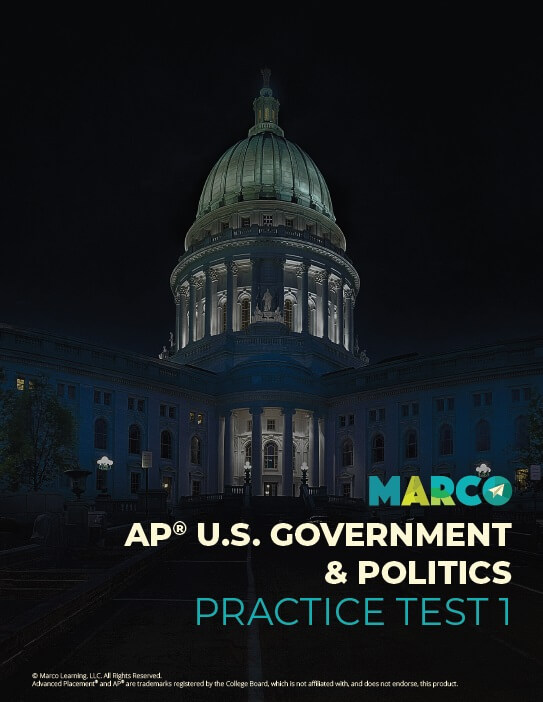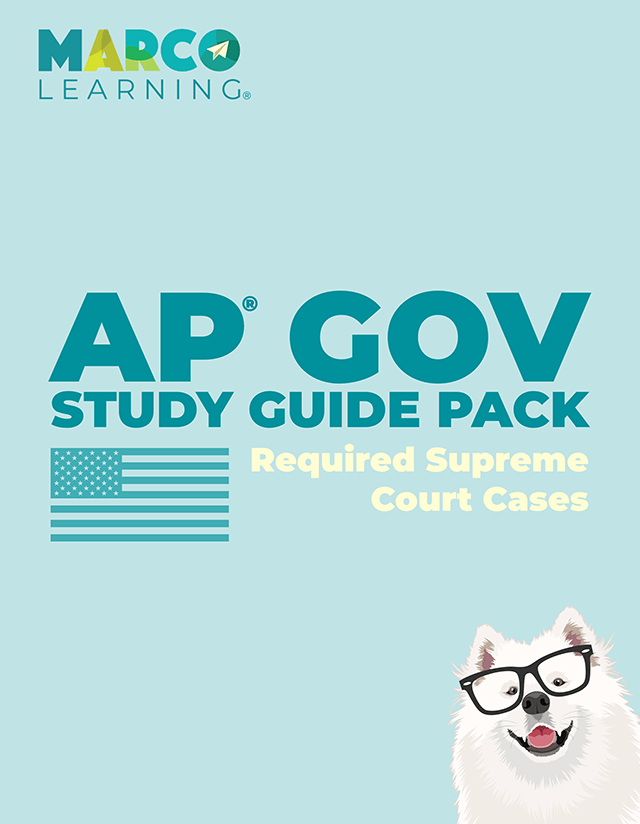


To score well on your AP® U.S. Government and Politics Exam, it is important to become familiar with all of the required Supreme Court cases. In the free-response section of your AP U.S. Government Exam, you will have to answer four essay questions. The third of these questions is a SCOTUS comparison essay, in which you will be required to compare a non-required Supreme Court case with a required Supreme Court case, so get to know each required Supreme Court case as well as possible!
The required Supreme Court cases for the AP U.S. Government and Politics Exam in 2021 are:
Marbury v. Madison (1803)
McCulloch v. Maryland (1819)
Schenck v. the United States (1919)
Brown v. Board of Education (1954)
Engel v. Vitale (1962)
Baker v. Carr (1962)
Gideon v. Wainwright (1963)
Tinker v. Des Moines Independent Community School District (1969)
New York Times Co. v. United States (1971)
Wisconsin v. Yoder (1972)
Roe v. Wade (1973)
Shaw v. Reno (1993)
United States v. Lopez (1995)
McDonald v. Chicago (2010)
Citizens United v. Federal Election Commission (2010)
Marbury v. Madison
Marbury v. Madison is one of the required Supreme Court cases for AP U.S. Government and Politics. This case resulted in the landmark decision that established the authority of American courts to overturn laws and invalidate government actions that violate the Constitution.
Tom Richey delves deeper into the facts of the case in this video:
FACTS OF THE CASE
At the end of his presidency, Federalist John Adams appointed numerous individuals to positions within the government. The formalized appointments, known as commissions, were not delivered before the presidential turnover for four of these individuals, including William Marbury. When Democratic-Republican President Thomas Jefferson assumed office, his Secretary of State, James Madison, refused to deliver the commissions.
Marbury and the other three individuals who were refused their commissions sued and asked the Supreme Court to deliver a writ of mandamus, or judicial command, to force James Madison to deliver the commissions. The plaintiffs argued that section 13 of the Judiciary Act of 1789 gave the Court the authority to deliver a mandamus that would compel Madison to act.
THE DECISION
In a unanimous opinion, the Court ruled that the relevant provision within the Judiciary Act of 1789 was unconstitutional, noting that issuing writs of mandate was outside of the “original jurisdiction” of the Supreme Court as established in Article III of the constitution. Furthermore, the Court ruled that the Congress, in creating the Judiciary Act, had exceeded its authority. When an act of Congress is in conflict with the Constitution, Marshall wrote, the Court must uphold the Constitution as supreme.
IMPACT
The decision in Marbury v. Madison, written by Chief Justice John Marshall, was one of the most influential Supreme Court findings in American history. For the first time, the Court used the Constitution to overrule Congress. The decision played a crucial role in establishing the judiciary as equal to the executive and legislative branches of government and remains one of the foundational pillars of the American system of checks and balances. Because the Constitution itself says very little about the specific functions of the federal court system, the decision in Marbury v. Madison has become the pillar upon which every other Supreme Court decision stands.
PRECEDENT & SUBSEQUENT CASES
There is no precedent for Marbury v. Madison, but nearly all subsequent Supreme Court cases rely upon the precedent set in this case.
KEY TERMS
Judicial Review The power of federal courts to declare laws and government actions invalid when those laws of actions conflict with the Constitution.
Separation of Powers/Checks and Balances The American model of government wherein the legislative, executive, and judicial branches have independent powers and areas of responsibility; no individual branch has unchecked power.
Writ of Mandamus An order from a court to a government official to fulfill their official duties.
The best way to get better at something is by practicing.
That’s why it’s so important that you take practice tests to help you get better at the AP U.S. Government and Politics Exam. Only then can you expect to get a good score—and even improve your score.
 Help
Help